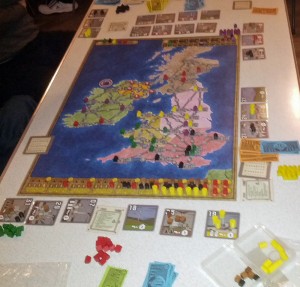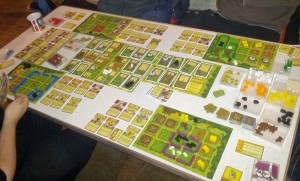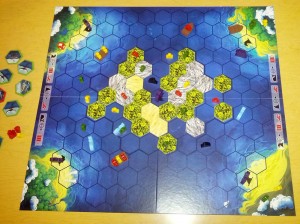Arrived this week to discover most of the members of the club gathered in a huddle outside the front door; it transpired that a circus school trapeze class was still in full swing (Ha! “full swing”! Did you see what I did there? Huh? Did you?). I don’t think they were aware that we had the hall booked, as they seemed to be planning to hold some kind of extra-curricular aerial training session throughout the evening… but they apologetically started stowing their equipment away when the board-gamers began to arrive en-mass.
Hmmm. I wonder who would win a fight between a troupe of trained circus performers, and a pack of disgruntled middle-aged geeks, desperate for their fortnightly boardgaming fix.
Anyway, it took them a while to hoist all their bits and pieces away, so we started a bit late. Eager to get things underway — and having already pre-planned a game with Olly & Owain — I promptly set up my new copy of:
Power Grid: UK & Northern Europe
After a short period of map critique from various passers-by (mostly expressing surprise at the somewhat-creative positioning of many UK cities), we roped in a couple of extra players — Lloyd and Gordon — and the game got underway.
It was the first time that any of us had played this map; it was launched a couple of weeks ago at Essen, and only had its UK release earlier this week. As we played, it struck me as a fairly gentle map; no overly-cruel choke points, and a fairly even spread of cheap bits and expensive bits. The map’s main gimmick — being able to start two different grids (one on Britain, one on Ireland) didn’t seem to have a major impact on the game, but that might be because we chose Northern Ireland to be the excluded territory on this particular outing, possibly making that side of the map a slightly less attractive investment. The most interesting aspect was probably the resource flow for the UK — starting with zero uranium in the first round (though plenty later), and ending with fewer-than-normal fossil fuels in phase 3 (in fact, Gordon was denied a victory opportunity purely due to the fact that the coal market was entirely exhausted at a strategically-critical point).
It was a very close game — Gordon took an early lead of one or two cities and (amazingly) managed to maintain it pretty much throughout the game. He won the game with 17 cities… I was one behind on 16, and I think the other players ended on 14/15.
I don’t think this’ll rank as one of my favourite PG maps, though I expect it’ll get plenty of plays purely by virtue of it featuring the UK… and it does seem to be a fairly evenly-balanced/accessible one for new players. If I played it again with experienced PG players, I’d be tempted to toss in plenty of promo cards to spice it up a bit.
The flip-side of the map — Northern Europe — features some alternative powerplant cards, which seem like an interesting tweak. John Flynn’s copy of this map was being played at a different table; it’ll be interesting to read how the session went.
(…and a third table was playing a copy of Friedemann Friese’s Copy Cat at the same time as both of the power-grid games were going on. 2F games have clearly made a big impact on Newcastle Gamers this week!)
Next: Agricola
Yay! 17th Century subsistence farming!
The last few times I’ve played Agricola, it’s generally been with first-timers, and we’ve mostly been playing with the E-deck (aka the “beginners” deck). This time, most of the people playing had prior Agricola experience (Jerome had only played once, but played scarily well on that single occasion), so we played with a 3/4 mix of E-Deck and I-Deck cards. I think the result was a pretty interesting game.
The “I” in I-deck stands for “interactive” … with the occupations and major improvements tending towards (though not exclusively based on) effects which piggy-back on the actions or improvements of your opponents. So, for example, Olly’s wood trader allowed him to buy a chunk of wood off another player whenever that particular player took a wood-gathering action. My fence builder occupation got me resources whenever somebody added fences to their farm… one of my minor improvements was a special clay pit which other players could visit by paying me food… etc etc. Difficulty-wise, it’s not much of a step up from the E-deck … but it does introduce some pleasing player-to-player transactions.
By some fluke, I got a dealt a hand full of clay-based improvements and occupations at the start of the game… far more than I could practically bring into effect. I settled into a combo that gave me a cheap route to a sizeable clay house. Olly had the baker occupation and a mill-stone improvement, which set him up for a strong bread-baking tactic, and Jerome (whose cards I didn’t really see in detail as he was sitting diagonally opposite) seemed to have an extremely effective vegetable-growing tactic set up (including a special oven that converted 1 veg to 4 food). I suspect the cards had been less-kind to Russell; he played a fairly straight game of ‘gric with a rush for family growth and a 4-room stone house.
Final scores: Jerome and I tied on 29, Olly had 27 (amazingly playing most of the game with only 2 family members!), and Russell ended with 21.
Enjoyable game. Agricola is always an enjoyable game.
Finally: Survive: Escape from Atlantis
First time I’ve played this, and I *really* enjoyed it. It’s light, it’s aimed at a family audience, and it has a fair bit of randomness involved — so isn’t the kind of thing I’m usually very into — but it’s a cracking bit of game design, successfully balances the luck with planning and strategy, and was the perfect ending to the evening after a couple of weighty, thinky titles.
Survive:Escape from Atlantis is a fairly straightforward “chase” game … you start with a set of meeples on an island in the middle of the ocean. Each turn, a chunk of island sinks into the waves, and eventually one of the sunken bits of island will reveal a volcano which promptly explodes and ends the game. The object of the game is to evacuate your meeples… either by boat, or by swimming… to the safety of neighbouring islands before the volcano appears.
However, the waters around the island are infested with sea monsters, sharks, and boat-destroying whales. After you’ve moved your meeples, you get a chance to move one of these monsters at random, and mess with your opponent’s plans. It’s cut-throat, brilliant fun, and has moved pretty close to the top of my list of “things I’m likely to buy very soon”. Enjoyed it a lot — highly recommended
Best bit of the night: Survive: Escape from Atlantis… though Agricola ranks a close second.
Worst bit: that slightly awkward moment where a gang of middle age blokes come along and kick a bunch of happy young circus girls out of the playground, ‘cos they want to play boardgames
Lucky escape of the night: I almost got lured into playing a “Japanese deck-building game”, but I turned it down when I discovered it took about 2 hours to play. It was only later in the night that I spotted a Barbarossa box lurking at the back of the games-people-brought-in table. Most of the artwork in Barbarossa involves imagery of Nazi anime girls, in lingerie, caressing overtly-phalic weaponry, and having extreme difficulty keeping their thighs together. Even if I had a T-Shirt emblazoned with the slogan “THIS IS IRONIC”, I wouldn’t feel particularly comfortable playing that game at a public gaming group. Or, for that matter, “at all”. Kind of glad it didn’t get as far as the table before I had to make my excuses. Hmmm.
Anyway, it’s been a good week for games. Aside from the above gaming sesh, I also managed to sneak in games of Suburbia and Troyes at Owain’s place mid-week (Suburbia opinion: quite enjoyed it, and I’d happily play it again, but it’s not one I’d pro-actively put forward for playing during a session — it just didn’t push the right buttons for me for some reason), and clocked up games of Chronology, Pandemic and Zooloretto while visiting my parents on Friday night. We’ve even managed a few Dectet games on evenings in between (Emu Ranchers = brilliant!). I’ve been spoilt. And it’s not even Christmas yet!
CREDITS:
Pictures courtesy of Olly. Newcastle Gamers meets on the second and last Saturday of the month. Usual cost is £3 (or £1 for concessions), but your first visit is free … check our G+ group for more info.






 Follow
Follow
Pingback: Newcastle Gamers – 29th December | John's bit of the web